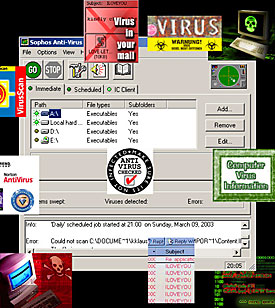 |
|
PHOTO ILLUSTRATION BY KEVIN KLAUS
|
Students often let viruses onto their computers unknowingly, even though many use software protection programs. Popular file-sharing programs such as KaZaa and LimeWire are common culprits, along with the seemingly standard pop-up ads.
|
|
By Arek Sarkissian II
Arizona Daily Wildcat
Wednesday March 12, 2003
With thousands of data-munching, system-speed-slowing viruses created every day, computer users and experts alike are struggling to protect their systems.
The bugs are finding new and faster ways of entering machines across campus and in homes, because nearly as soon as software protection programs detect one, another seems to slip through the cracks, said Chris Carpenter, systems analyst for the College of Social and Behavioral Sciences computer network.
Carpenter said that many users rely too heavily on their virus protection software; meanwhile their systems often continue to contract viruses the old-fashioned way, through e-mails that promise anything from riches to explicit pictures.
"The biggest factor is the human factor, people just don't know," Carpenter said.
Ted Frohling, network systems analyst for the Center for Computing and Information Technology agreed. He said that while viruses that attack thousands of computers across the nation might be making headlines, it might be too much to say that awareness is increasing.
"I'd be hopeful to say that's happening, but I don't think it is," Frohling said.
What is increasing, however, is the susceptibility of systems to viruses that spread through download sharing programs such as KaZaa and LimeWire, which are used by students to download software.
"They'll download a program, and for some reason, it won't run correctly. That's probably a virus," Carpenter said.
He added that some people might have viruses on their computer and not even know it. For instance, Carpenter recalled one computer in the women's studies department that had at least 700 viruses.
"It was like someone added them on there," he said.
But the SBS College and CCIT are still working to protect computers, let alone keep them updated. All computers that log onto the SBS server are automatically updated with virus signatures that computers can trace for infections. Both the college and CCIT are working with a company called SOPHOS, which by contract supplies the university with information to keep its computers as up to date as possible. Even computers that stay logged into the server are regularly updated.
It's the users who have dealt with a virus before that are the most aware and serve as a computer's best source of protection, Carpenter said.
"Most of the time they don't want to deal with us taking three hours to reformat their computer," Carpenter said.
But regardless of time, some people believe that protection programs aren't always effective.
Even years of self-proclaimed expertise in computers couldn't help psychology senior Joel Nagler, who was infected with a virus that a protection program had quarantined.
"Yeah, there's the feeling of security just because it updated every day. All it does is look for viruses your computer already doesn't have," Nagler said. "The best way to prevent is to not get them at all."
Retail and Consumer Sciences senior Melissa Welch agreed with Nagler. She said her parents' computer became infected despite a protection program.
"I just stay aware of them. I've got a Web site that has all the virus names in my favorites folder," she said.
Frohling said that people who want to protect their computers from home can also access the university license Web site with the same identification and password and they use to access their university e-mail.
Frohling said UA is also taking steps to use SOPHOS to protect servers that handle contaminated e-mail.
But no matter what steps the university may take, protecting computers against viruses will always be an uphill battle, Carpenter said.
"Even we're always playing catch-up. You can't catch a virus until it exists," he said.
Recently a virus called a "Slammer" infected windows-based computers across the country for months, and it was able to do so because administrators never saw it.
"A lot of administrators didn't have time or just didn't know," he said.

